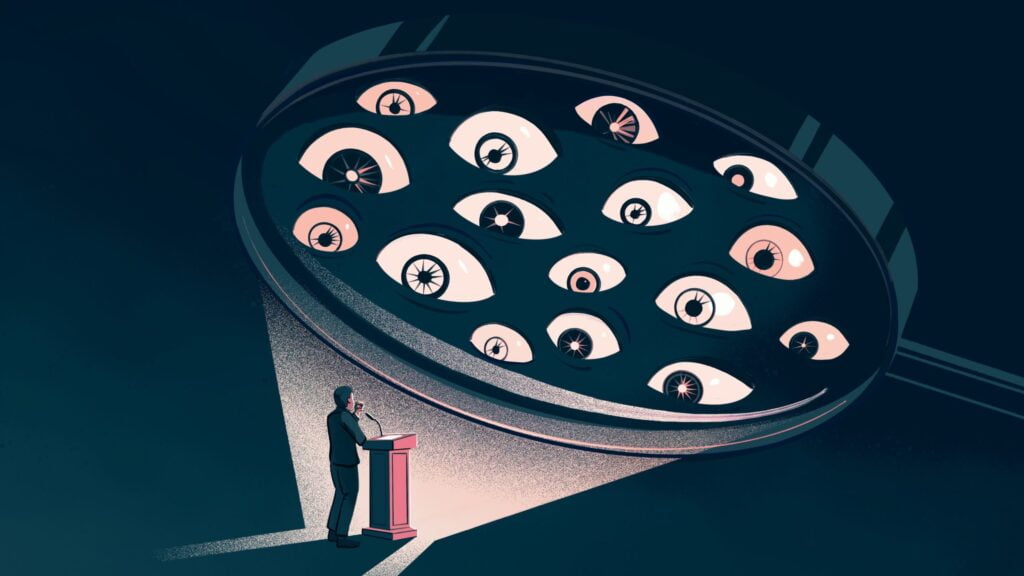Here’s a secret; the world’s best public speakers all mess up on stage. Public speaking is a skill like any other and the only way to get better at it is to practice. While some people may find it easier than others, feeling nervous on stage is natural.
When I was in full-time employment, I regularly had to speak in front of large and small crowds and I can promise you that I was nervous every single time.
So what’s the trick to fighting stage fright? It’s not about getting rid of your nervous energy, but getting used to it. If you know that you’re going to feel nervous, you can prepare yourself for it and use that energy to your advantage. However, if you expect to irradicate your nerves completely, then you might be in for a shock.
With that in mind, here are some tips to help you prepare yourself for your next public appearance, and it all starts with planning.
Planning and preparation
Planning is all about gaining as much control of a situation as possible, so if you feel nervous it’s because you feel that you don’t have control of the situation. However, the more you planning you do, the more control you’ll have, which will make you more confident when it comes to being in the spotlight.
It also means that you’ll be less likely to make any mistakes and you’ll be better prepared to deal with anything that goes wrong – even the thing going wrong is outside of your control, such as your microphone cutting out halfway through your speech.
Even if you do make a mistake yourself, you’ll be able to deal with it much better when you feel in control of the situation, which is easy to do if you follow these steps:
● Plan you presentation
If you’re putting together a new presentation from scratch, there are a lot of things you should consider to make it as good as can be, including the flow, the content and the design etc.
So before you open up PowerPoint, put pen to paper and write down what you want to include in your presentation and the order in which that information should be given.
● Write a script
Even if you have a presentation, writing a script is essential. This will help ensure you include everything you have to say and it will be a good resource to help you rehearse – which is also very important, obviously.
A lot goes into planning and creating a good presentation and script, more than we can possibly cover in this article alone. So to help you prepare, we’ve written a second article covering these very steps. I can’t emphasise enough how planning and preparation will help you nail a presentation, for me it’s more than half the battle when fighting nerves.
Mental preparation for and on the day
Feeling nervous before speaking publicly shouldn’t come as a surprise, it’s going to happen no matter how much planning you do, but there are ways to not only appear more confident on stage but to feel it as well.
Fortunately, the key to getting through a presentation is surviving the first five minutes. Once you realise how well it’s going, you’ll fly through the rest. This doesn’t mean there’s no room for error because there is – it’s fine to make mistakes, it’s how you deal with those mistakes that’s important. Trust me when I say that you’ll feel on top of the world when it’s over.
To help you get there, here are a few tips and tricks:
Before your presentation
● Revise
Keep your script close by and read it at any and every opportunity (ie. on the train, in a waiting room, in bed). You might even take this a step further and record yourself reading the script and listening to it when you can’t read it (driving, running, walking).
● Rehearse, rehearse, rehearse
In the mirror, in your head, to a friend and/or to a colleague. You’re going to want a second opinion on the script, but to ensure they get the tone it’s better to rehearse it for them. Listen to their feedback and take at least some of it on board.
During your presentation
When your moment arrives, you’re still going to feel nervous. I keep saying this because it’s true and it’s important to accept that you’ll feel nervous so it doesn’t come as a shock. Be that as it may, here’s how to deal with those butterflies:
● Breathe
Breathing has been a lifesaver for me, many, many times. It sounds simple, but it’s very easy to forget when you’re speaking. So, when you’re on stage or on Zoom, try to think more about your breathing.
This is the most effective technique that I’ve found in dealing with stage fright. Not only will it help you keep your nerves in check, but it will also help regulate your voice and the way you talk, so you won’t end up speaking too fast, too slow or sounding shaky. Also, if at any point you feel yourself getting flustered, or you trip over a sentence, just take a breath – the audience won’t notice and it’ll give you a moment to regain focus.
I know there’s a lot going on when you’re in the spotlight, but breathing doesn’t require much thought. I’d suggest you even practice your breathing when you rehearse your script – you could even write ‘BREATHE’ on your script as a reminder.
● Dress to impress
This isn’t for the benefit of your audience, it’s for you. When you’re dressed up to the nines, you’ll naturally feel more confident, which can go a long way. Even if you’re presenting from home over Zoom, putting on a smart shirt or nice dress can go a long way in helping you get in the zone.
● Using your energy
If you’ve read and rehearsed your script as often as I do before an event, you’ll be bored of it by the time it comes to actually performing it. Of course, no audience wants to hear a bored speaker, so if you’re standing still and giving your speech in one single tone, they’re going to be even more bored than you are.
This is where your nervous energy becomes useful, you can use all that adrenaline coursing through your body to be more animated. Move around, use your hands, look at your audience, smile a lot and act excited… Use that energy to keep your audience engaged!
● Laugh at yourself
If anything goes wrong while you’re on stage, whether it’s your mistake or something outside of your control, laughing at yourself or making a joke about it, is the best way to deal with it. While there’s a good chance your audience won’t notice, if they do just laugh it off. Nine times out of 10, they’ll laugh along with you.
This in turn will help you feel more relaxed because what may have felt like a tense and serious situation, will feel much more light-hearted when everyone’s laughing.
● Striking up a rapport
Try to find a way to bond with your audience early on in the presentation. This could be welcoming people at the door, going around the room to introduce everyone or encouraging people to say hello at the beginning of your presentation. These examples may not be appropriate for every setting, but you can do this however you see fit. The important thing to take away is that once you’ve got a rapport with your audience, they won’t appear as scary as they did before because you’ll realise how friendly they really are.
To summarise then, while a big part of controlling your nerves comes down to planning your presentation and script (please do write a script!) and mentally preparing yourself for the event, there are several tips and tricks you can use to be more confident on stage.
Here’s one more tip for you: Everyone in your audience is rooting for you. They all want you to succeed. Don’t forget that.




